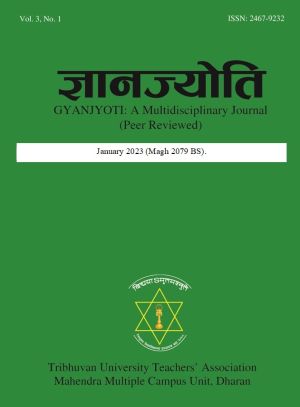Does Fiscal Deficit Cause Economic Growth? Evidence from Nepal
DOI:
https://doi.org/10.3126/gyanjyoti.v3i1.53034Keywords:
fiscal deficit, economic growth, ARDL, Granger causalityAbstract
The fiscal deficit soared tremendously after Nepal endorsed economic liberalization aftermath of the 1990s democracy. The purpose of the paper is to investigate the effects of fiscal deficit in the economic growth of Nepal. Data from 1980 to 2019 were used to estimate the short- and long-run causal relations of fiscal deficit proxied by total government expenditure minus total government revenue as a percent of gross domestic product (GDP) and growth rate of real GDP as a proxy of economic growth along with other control variables. The autoregressive distributed lag (ARDL) error correction regression and vector error correction model (VECM) Granger causality have employed to meet the purpose of the study. The study reveals that there is short-run statistically significant negative relationship between Nepal's economic growth and the fiscal deficit of the previous year. However, both domestic and foreign loan and economic growth have positive and significant relations in short run. In contrast, the results reveal that there is positive but not significant relationship between the fiscal deficit and the economic growth of Nepal in long run. The Granger causality suggests that fiscal deficit does not Granger cause the economic growth of Nepal. However, economic growth does Granger causes the fiscal deficit in Nepal. Thus, the growth-driven fiscal deficit will be more effective in the economy of Nepal. Based on stylized facts, it will be necessary to redirect deficit financing into productive channels in order to enhance the sustainable economic growth.




